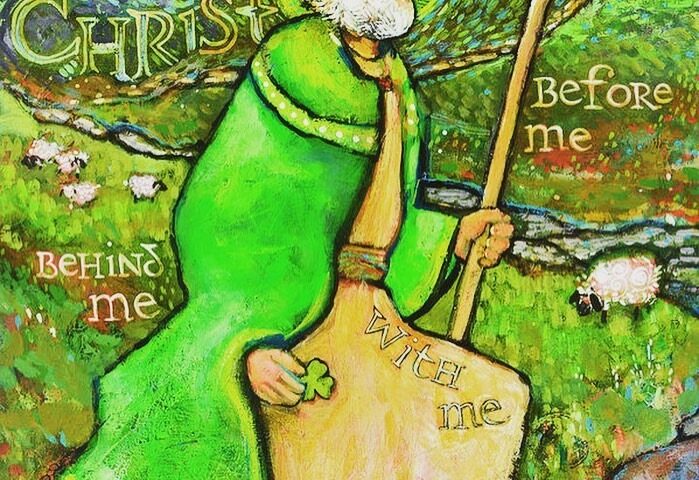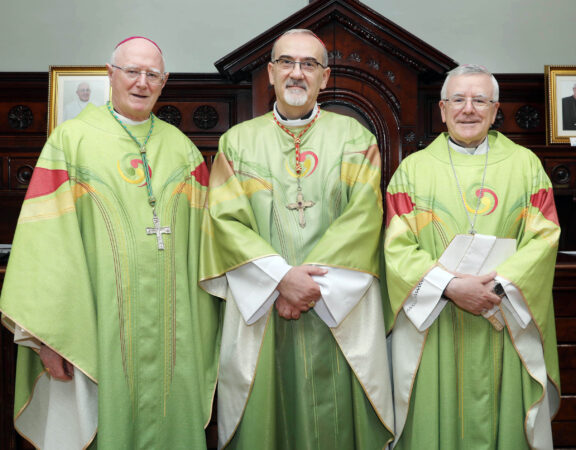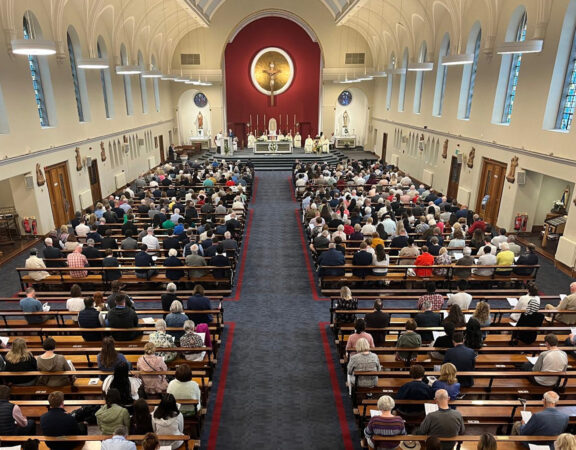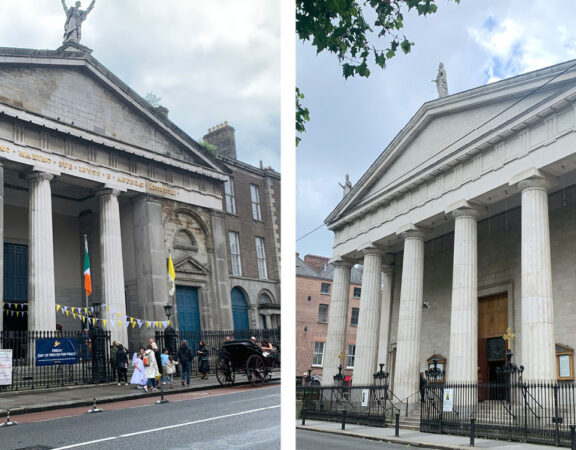Saint Patrick’s Day
Homily Notes of Archbishop Dermot Farrell
Saint Patrick’s Church, Ringsend, 17th March 2021
We celebrate the Feast Day of our patron saint in the strangest of times. We are very familiar with the story of Saint Patrick, his capture and coming to Ireland as a slave. As we read his confession we get an insight into a man who was strong, and courageous. His life drew sense from Christ. Patrick knew first-hand the consolation, hope, and strength that come from Christ.
Patrick also knew what it was to have one’s life turned upside down: from a life of privilege to the life of a slave, from the familiar to the strange, from security to dependence on strangers. In all this Patrick’s deep trust in Christ kept him going, as one can hear in the deep faith and closeness to Christ in the words of Patrick’s Breastplate where he invites Christ to surround him with shield of protection: “Christ with me, Christ before me, Christ behind me, Christ in me, Christ beneath me, Christ above me, Christ on my right, Christ on my left.”
For Patrick “faith is the substance of things hoped for, the conviction of realities that are unseen” (Heb 11:1). His faith was a relationship with Christ. It was not a theological mystery to be solved, but with his life rooted in prayer, it was walking in the darkness. The surrounding culture certainly did not share his faith, but he had the courage to make it known. For Patrick faith was not a statement that God existed, but it was a relationship that involved bearing witness to God in a difficult environment. For us today, the challenge is similar: to bring the gospel, the good news that is Jesus Christ, to a parish, to a culture, to a people that may not know him or, knowing him, find it difficult to live their lives in his light. That takes courage and conviction.
This past year has been a tumultuous one for people of faith with all churches closed over many months for public worship. Our own Church, and other faith communities have been vocal and clear in emphasising the civic and moral duty to promote the common good by observing public health guidelines. Every reasonable and responsible person knows that keeping a safe distance from others is vital to the control of the virus. Whenever public worship was permitted, our parishes have been diligent in operating within guidelines, with great commitment by staff and volunteers to stewarding, sanitising and managing attendance.
Parishes have developed innovative ways to support communities and the most vulnerable through streaming of services, using social media groups, and by telephone contact with the isolated and vulnerable. For many people, being denied the opportunity to attend Mass and receive Holy Communion has been difficult: it has affected how they are nourished and sustained by their faith. Let us not underestimate the consequences of this in people’s lives.
Our faith makes a difference. Our faith and its practice – both private and communal – makes a difference. This, after all, is what all Churches and all religions proclaim. For the Christian, Christ makes a difference. This is what Patrick came to proclaim: “Chríost liom, Chríost romham—Christ be with me, Christ before me, Christ on my right, Christ on my left.” Patrick’s prayer was not only “Christ within me,” but also “Christ in the mouth of everyone who speaks to me, Christ in the eye of everyone who sees me.” Every living faith has both an essential interior dimension and an essential communal dimension. We need both. For people of faith, the effects of the pandemic are most keenly felt at the communal level; we now have to ask if there are not better ways of managing this essential dimension of our lives together.
Faith and the communal celebration of faith make a difference to people. Prayer and communal worship are not just an optional pastime. The spiritual and the human go hand in hand. Our spirituality, how it is lived, and how it is publicly expressed bring significant benefits to people – and to all people of faith – irrespective of age or income, irrespective of where or with whom we live. Christ came that we “may have life and have it to the full” (John 10:10). And people came to Him – on their own – like Nicodemus in last Sunday’s gospel, and in crowds; and they came to him for healing and comfort, for support and inspiration.
Is this not what Church is? The community where Christ is alive – where His healing touch is felt, His word of comfort and consolation are heard, where people are supported, where the Word of God inspires. Patrick knew this, “I bind to myself to-day, the power of the Incarnation of Christ, and of his Baptism, the power of the Crucifixion and of his Burial, the power of the Resurrection, and of his Ascension…” We know it.
The planned exit from the current severe restrictions is being watched by many citizens who expect their religious practice to be respected by the public authorities, and not be subordinated to commercial interests. This is a matter of health and wellbeing for many. Health, as we discover again and again, is not just a matter of avoiding disease, it is a matter of how we are in ourselves, it involves our emotions and our mental health.
It is clear that restrictions on social interaction are designed to limit the risk of virus transmission. NPHET guidelines have made it clear that it is the volume of interactions, as much as their type, which matters for public safety. There are choices to be made between different types of social interaction as restrictions are unwound.
From the perspective of the State, the right to public worship is protected by the Constitution of Ireland (Article 44). However, the number who are allowed to worship cannot be randomly determined as if were some mathematical formula. This is about people: the protection of people’s health, and the fostering of people’s wellbeing. While a balance must be struck, easing restrictions on worship has a better founded statutory claim than other activities which may be pressed by powerful commercial interests. Worship has a clear human priority over other activities that do not possess that priority of themselves.
In particular, the restriction on attendance at funerals to 10 people is harsh and unfair. Close family members are frequently denied the right to be present in Church at the funeral of their loved ones: at times, people who have been with the deceased for years. This is tolerable only in the most extreme circumstances, and for the shortest possible period.
As a matter of human dignity and fairness — but even more so as matter of wellbeing and the restoration of normality, I call on the public authorities to give assurance that the legitimate desire of people to gather responsibly and within reasonable guidelines to exercise their constitutional right to worship will be prioritised in the easing of restrictions.
We come together in faith and offer our prayer for the healing of the many sick people, remembering the victims of this past year, and asking that their families and friends might find consolation and comfort. We pray for all who are called to carry the burden of the pandemic – especially people who work in the health services to guarantee the smooth functioning of society, and for all who support them.
Today we pray that we might be caught by Saint Patrick’s belief in the power of prayer, the convictions of his faith, and in the closeness of God, as well as the support and prayers of our sisters and brothers. As we turn towards God for protection, as Saint Patrick did, may the Lord bring us inner freedom, a dedication to the call of God, and a deep trust in the active presence of the Holy Spirit.
Saint Patrick, Apostle of Ireland, pray for us. Pádraig Aspal, guí orainn. Beannachtaí na Féile oraibh go léir.
ENDS








